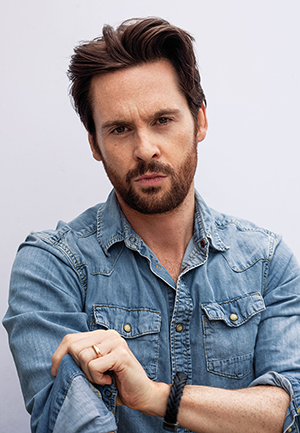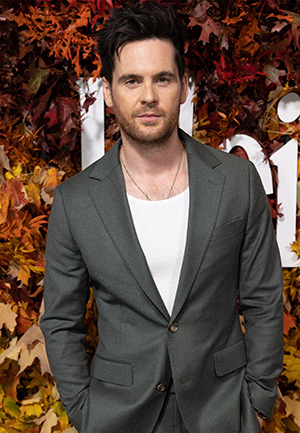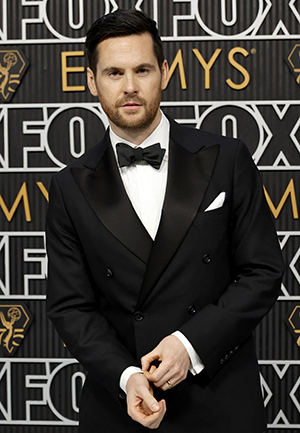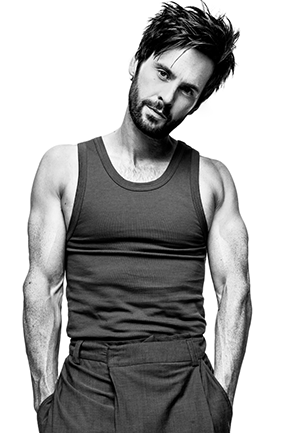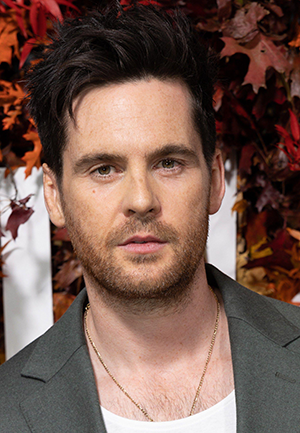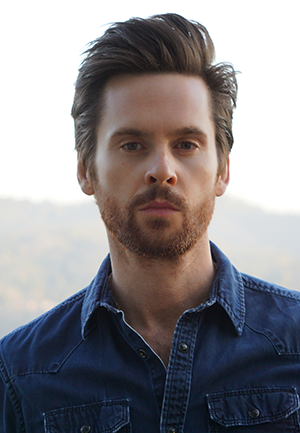A fascinating new interview with Tom Riley, along with the above gorgeous photo, has been shared here to promote new series Dark Heart. I disagree strongly with the bags under the eyes comment, mind! Read the interview in full on the site. Dark Heart starts 9pm Wednesday 31st October on ITV.
As opening sequences go, the original first scenes of new ITV crime drama Dark Heart are disturbing to say the least. Just minutes in, the police stumble upon a murder so brutal, it’s a challenge to keep one’s eyes on the TV screen. The victim, a man, lies prostrate on a blood-stained bed. His eyes have been gouged out and his testicles removed and placed in the empty eye sockets.
It’s visceral, violent stuff. Which is perhaps why ITV made a few edits. Some scenes, including this one, from the series pilot – which aired in 2016 on the now defunct ITV Encore, ITV’s edgy little sister – have been reshot for mainstream audiences who have more delicate constitutions. Gone are the testicles protruding from bloody sockets and instead two round white lumps rest next to the victim’s head: freshly gouged eyeballs. The scene might have had its sharp edges buffed off but it’s all still pretty grim.
“The scene is an audience divider,” admits Tom Riley, who plays DI Will Wagstaffe (known as Staffe) in the series. But is there more to the series than gore? The story – which is based on a series of books by novelist Adam Creed and written by Unforgotten’s Chris Lang – follows Riley’s character, who is haunted by the unsolved murder of his parents when he was a teenager.
His personal demons affect both his private and professional life. So far, he sounds like a TV detective. Aren’t they all tortured mavericks who don’t play by the rules but still, somehow, catch the baddie in the end? Crime overkill?
Riley insists his character is different. “In the case of Staffe, it feels more like these personality flaws are obstacles to completing these cases,” he says. “They’re things that he has to overcome in order to be a cop, rather than being things that are an advantage and that just felt slightly more realistic.” ‘As a man I think my job is to keep my ears open and my mouth shut on the issue’
Riley isn’t actually a fan of crime dramas. He has enjoyed a couple, recently (Broadchurch was one) and watched Prime Suspect as a child, but, in the main, they’re not his cup of tea. “They do become white noise,” he admits. “I like ones with a grittier edge to them. I tend to wash over the ones which are about small villages and local vet-types solving the case.” Midsomer Murders, then? “I’m not naming any names.”
But even gritty crime dramas have become two-a-penny. Liar, The Missing, Line of Duty, Marcella and The Loch are but a few examples that have graced our TV screens in recent years. In fact, one can’t help but wonder whether Lang’s decision to open on such a grisly killing was driven by a desire to stand out in a genre that has become bloated and predictable. Riley won’t speak on behalf of Lang but will admit that he worries about becoming indistinguishable – especially now we are overrun with content on platforms such as Netflix and Amazon Prime, as well as on TV.
“With 50 new series coming out weekly on a variety of different platforms, if you’re not into something quickly, there’s always something to switch over to,” says Riley, claiming platforms are now so “hungry for content” that failing series often stay on air for longer than they would have in previous years, trapping actors in damp-squib roles.
It’s the risk you take when you commit to a series, he says. “The only thing you can really do is try and do the best version of whatever you’re trying to create and hopefully that will stand out from the crowd.”
In fact, Dark Heart does have an edge. The murder victims – including the unfortunate soul in the opening scenes – have all, in the past, been accused of child abuse. None of the allegations were proven but the suggestion, in the series, is that their accusers are behind their murders. It leads to a moral conflict for the audience, as well as Staffe, as we are invited to dwell on whether action taken by people who felt justice wasn’t served is in itself justifiable.
There is a particular scene in which Riley’s character shouts down a member of his team who suggests the murder victims are less deserving of sympathy than others. “Staffe is talking to himself as well as talking to his team,” says Riley. “He knows what the right thing to do is within the boundaries of the law but that doesn’t necessarily mean it’s something that sits emotionally very well with him.
The series’ pilot was shot three years ago, before the #MeToo movement took hold, but Riley sees now there are parallels. “It’s only really in talking to journalists since that I’ve realised that what we were talking about was the way that accused people, when the allegation is still unproven, are treated and how they should be treated and what’s right and what’s wrong,” he says. “It certainly wasn’t something that was discussed as much (when the pilot first aired) which I think is very much a sign of where we are now.” He refuses to be drawn into a wider chat about #MeToo. “As a man I think my job is to keep my ears open and my mouth shut on the issue.”
Tom Riley graduated from LAMDA in 2005 and has since made his name in shows such as Amazon’s fashion drama The Collection, US hit show Da Vinci’s Demons and BBC cancer-comedy Ill Behaviour. Period shows such as The Collection and Da Vinci’s Demons, he says, have a certain flamboyance to them. “The period stuff felt like it served as armour: ‘I can be out there because I’m restrained by character and costume and dialogue.” He had no such protection when playing Staffe. “It required something a lot more naturalistic and smaller,” he says. The character is scruffy, unshaven, with heavy bags under his eyes. He does, dare I say it, look a lot more like Riley himself.
Not that the actor is averse to changing his appearance for a role. When he was in Da Vinci’s Demons, the studio built him his own gym and the actor was required to submit his body fat percentages to the powers-that-be on a weekly basis. In Ill Behaviours, in which he played a character going through chemotherapy, he shaved his head every morning and drank green juice to lose weight. “It helps to look in the mirror and see someone else looking back at you,” he says. “I’ll do whatever.”
There are limits, though, to what Riley will do for a role. He has, in the past, refused to perform nude scenes which he sees as gratuitous. “I said no to something to such an extent that it almost jeopardised a job once,” he says, although he refuses to reveal which job it was. He has also questioned sex scenes involving a partner. “There have been times that I’ve stepped up and said, for someone else, you can’t do this, you need to either rewrite the scene or re-shoot the scene in a way that leaves everyone going home feeling like they haven’t left a bit of themselves and a bit of their soul at work. Because that’s not what we do this for. We don’t do this to give up the parts of ourselves that we want to keep our own, we do this to share the parts of ourselves that we’re willing to share and it’s no one’s right to request more if you’re not comfortable with it.”
Perhaps Riley is doing more than keeping his ears open and his mouth shut after all

